A Night outside the Palace
P5 P6 P9

A Pattern of Sub-par Living Conditions
P11
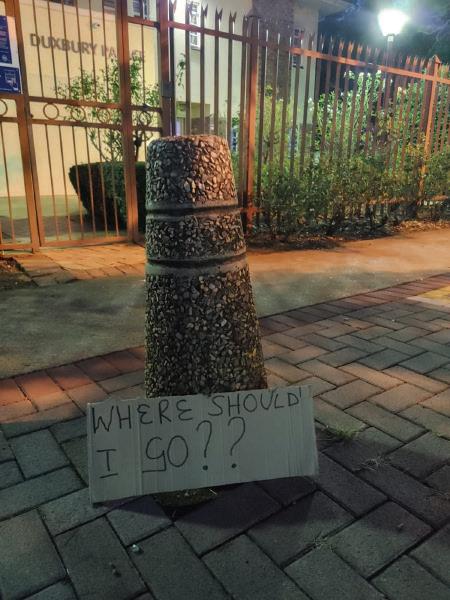
PDBY Year 85 Issue 2 10 March 2023 yourcampusnews.
PDBY
The Student’s guide to the jol Kicking Off Varsity Cup Check out the PDBY digital offering by scanning the QR code
The Truth About Tribalism
When will we finally admit that tribalism is our collective curse as Africans? How long will we keep calling it a remnant of colonialism and apartheid?
I can concede that apartheid – in particular – exacerbated tribalism through its creation of the homeland system. But the historical reality, however, is that tribalism predates the arrival of European settlers on African soil.
We as Africans have always been geographically divided along ethnic lines, and we have always had our own squabbles long before Europeans identified our continent as a playground for colonial activities. Our bloodied
history of inter-tribal wars and massacres bears testament to this fact.
The pseudo-Pan-Africanists and Black Consciousness thinkers who conveniently ignore this history and speak of a “united”, pre-colonial Africa, are either barefaced liars or embarrassed denialists. Upon reflection, their flawed narrative of pre-colonial African borders on a hysterical kind of utopianism.
May they be reminded that even Chinua Achebe – who was a towering figure in the postcolonial literature movement – never depicted pre-colonial Africa as a utopia that was marred by the arrival of colonisers. On the contrary,
PDBY Media
Copy:
Karla van Dyk
Lize Behrens
Luke Best
Nicholas da Costa
Kamogelo Thando Mabe
Luka Joubert
Jade Fabri
Lwando Mfundisi
Nolwazi Sangweni
Busisiwe Yaka
Layout:
Katherine Weber
Joshua Hunter
Annelize Breed
Owam Ngwneya
Izabel Stickells
Kirsten Minnaar
Franco Marais
Multimedia:
Masehle Mailula
Sharon Dumba
Katharine O’Ehley
Sechaba Ntshehi
Cleo Qin
Nothando Mhaule
Cletus Mulaudi
Web:
Luka Joubert
Carl Unathi Ndlovu
Keegan Bosman
Social Media:
Precious Maphupha
Thabang Moloi
Tsholofelo Mogotsi
Sibusiso Oaul Mabotja
he acknowledged the cleavages in pre-colonial society and explained how they were exploited by the colonisers to their advantage. In Things Fall Apart we are taught that those who found themselves on the margins of traditional Igbo society eventually converted to Christianity, and by default, joined the colonial system.
Sooner or later, we will need to have an unsettling conversation about this phenomenon that continues to haunt us in post-colonial Africa. Delaying the conversation or denying what has been outlined above will not solve the problem.
Ayanda Sakhile Zulu
TIP LINE
Letter policy yourcampusnews.
PDBYMedia, formerly Perdeby, is the official independent student newspaper of the University of Pretoria. We are committed to providing fresh and entertaining news content for UP students, by UP students, about UP issues.
carel.willemse@up.ac.za
Editorial Editor-in-chief carel.willemse@up.ac.za
Carel Willemse @Ed_in_Chief
Editor editor@pdby.co.za
Katherine Weber @pdbymedia
News news@pdby.co.za
Banathi Nkehli Deputy News news@pdby co.za
Features features@pdby.co.za
Kirsten Minnaar @kirsten_minnaar
Entertainment entertainment@pdby.co.za
Sport sport@pdby.co.za
Franco Marais
Copy copy@pdby.co.za
Karla van Dyk
Visuals visuals@pdby.co.za
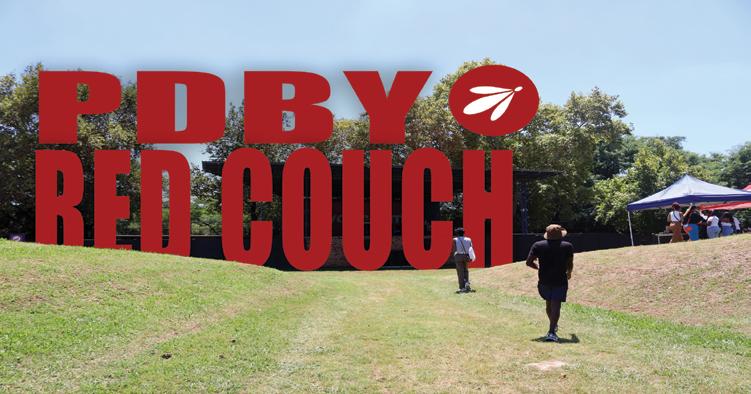
Katharine O’Ehley
Multimedia multimedia@pdby.co.za


Masehle Mailula @masehle_mailula
Layout layout@pdby.co.za
Katherine Weber @kelly.anne15
Web Luka Joubert webeditor@pdby.co.za
Social Media
Precious Maphupha socialmedia@pdby.co.za Marketing marketing@pdby.co.za
PDBY appreciates that freedom of speech is an inalienable right enshrined in the Constitution of the Republic South Africa. We encourage our readers to engage in discussion and debate on issues that affect them through letters to the Editor, comments on our website, tweets, or posts on Facebook. We ask our readers to keep the following in mind:
1. PDBY will not edit letters, comments, tweets, or Facebook posts in any way.
2. PDBY will label letters, comments, tweets, or Facebook posts as opinion. These do not represent the views of PDBY in any way.
3. The PDBY editorial must approve letters, comments, tweets, or Facebook posts before they are published.

4. PDBY will not publish letters, comments, tweets, or Facebook posts that are defamatory, or libelous, or that contain offensive content.
5. PDBY reserves the right to practice discretion when publishing letters, comments, tweets, or Facebook posts.
6. PDBY reserves the right to publish any content we receive unless the sender specifically requests otherwise.

7. PDBY reserves the right to retract a letter, comment, tweet, or Facebook post after it has been published.
8. PDBY will not accept responsibility for any consequences the author of a letter, comments, tweets, or Facebook posts may experience as a result of the letter being published.
9. PDBY will only publish letters between 150 and 200 words.
10. PDBY will not publish letters unless the writer confirms their full name, student number and contact number. PDBY will not publish this information, we need it for our records.
2 | Editorial 10 March 2023
Twitter:
Instagram:
Facebook:
Tel:
To
PDBY Media Print, Digital, and Broadcast Youth Media www.pdby.co.za
@PDBYMedia
@PDBYMedia
PDBYMedia
(012) 420 6597
advertise in PDBY contact Tel: 012 420 6597 Cell: 083 318 9738
Copyright PDBY is printed by Paarlmedia. All rights reserved. Contributions are welcome. All due care will be taken with materials submitted, but PDBY and printers cannot be held responsible for loss or damage. The editor reserves the right to edit, amend or alter in any way deemed necessary. PDBYcannot be responsible for unsolicited material. The opinions expressed in PDBY are not necessarily those of the editors and printers of PDBY
KNOW SOMETHING? SAY SOMETHING Send us your anonymous news tips by scanning the QR code.
Subscribe to PDBY’s YouTube channel and follow us on our social media. A new episode of PDBY Red Couch is now online.
Letter to the editor
THE SILENT PARTNERSHIP THAT “SAID” MORE THAN IT SHOULD
Banathi Nkehli, Micaela Liebenberg and Carel Willemse
The South African Students Congress (SASCO UP) called for the SRC to cease relations with the South African Union of Jewish Students (SAUJS). This follows an SRC meeting held on 26 February in which the head of Tuks SAUJS, Sasha Said, approached the SRC with the goal of establishing relations between the SRC and SAUJS. According to the minutes of the SRC meeting leaked to PDBY, a vote (eleven for, 3 against, and 1 abstaining) by the SRC secured the decision to work with SAUJS in order to raise money to work with students.

The big mess – why is SASCO so mad?
In the minutes, it was raised that SAUJS held Zionism as a founding pillar of its organisation, which is the source of SASCO’s backlash over the SRC’s decision. SASCO stated, “It is the view of SASCO UP that working with any Zionist structures in democratic South Africa goes against the core values of our Constitution.” During the meeting, Said offered her reassurance on the topic of SAUJS’s Zionism, stating, “Everyone has a different definition on what Zionism is, and we struggle with this because then we are labelled for what we stand for.” The nature of SASCO’s outrage is primarily rooted in associating a university structure with any form of Zionism, while SAUJS views the relationship as an opportunity to help poor students.
Where’s the money coming from, where’s the money going to –why is SAUJS here?
SAUJS approached the SRC offering financial aid, with the core premise of the meeting revolving around the potential use of the finances to help students who are currently facing historic debt. Said explained that SAUJS could find donors from among its alumni to provide assistance with a series of things such as “venues, funding, merchandise, food and beverages (alcoholic and non-alcoholic), as well as stationery packs”. In addition, SAUJS
requested the SRC to not make any statements in alignment with sentiments concerning Palestinian solidarity and the PSC UP (Palestine Solidarity Committee). This manner of aid is not unique to SAUJS Tuks, as Said explained that the SAUJS counterpart at Wits managed to raise funds for the Wits SRC.


In a responding statement, SASCO indicated that they viewed the acceptance of this funding as insensitive and, furthermore, that it would be tantamount to accepting a “masked bribe”. When asked what Said’s response was to the SASCO statement, she replied, “I would encourage you to speak to SASCO in regards to their statement. However, their members, who are also part of the PSC, were fully present during the initial engagement and, when it was voted on, lost by a two-thirds majority.”. Said continued, “We’re concerned that the PSC, as a narrow political interest group, is trying to undermine a democratic decision of the student council and trying to exclude Jewish students from university life.” A major point of contention between SASCO and SAUJS was Isreali Apartheid Week (IAW).
The true, the confusing and the unanswered questions
IAW is a platform used by the PSC to mobilize grassroots participation in a series of demonstrations in solidarity with the people of Palestine. In the minutes, Said explains that IAW “is associated with anti-Semitism around campuses”; she supports this claim by referencing the events of IAW 2022. Said’s recollection is inconsistent with the version of events covered by PDBY in an article titled ‘South African Union of Jewish Students clashes with the Palestinian Solidarity Committee’ (published on 9 May 2022). SASCO’s view is that IAW is necessary in the form that it currently exists because “[Zionism] has proven in practice to enable and sustain systemic apartheid policies in Palestine”. SASCO UP concluded their statement by urging all progressive structures such as the PSC, and Amnesty Internationalto “condemn this SRC’s poor decisions”.
Where the buck stops – what does the SRC say?

Image: Tshepang Rihlampfu
Eco-Swift Mobile Car Wash Clean it in a

PDBY approached the SRC to weigh in on the matter at
hand. SRC Deputy Secretary of the SRC, Christo Pretorius, responded on behalf of the SRC, “The SRC has a mandate to serve all students, a large part of this mandate is fundraising. The SRC reaches out to various bodies in an attempt to fulfil the aforementioned mandate.” Pretorius continued, “Any reaction by structures regarding the mandate of the SRC seems premature pending the contextual communication of decision… No MOU [Memorandum of Understanding] has been reached ” When asked if the SRC had any specific plans for the funds Pretorius replied, “The current dire financial situation that thousands of students find themselves in, pertaining to historical debt, registration holds, and accommodation issues, is foremost on the SRC’s agenda.”
3 | News 10 March 2023
Snap A student-run eco-friendly mobile car wash - 100% environmentally friendly. - 100% natural and soluble cleaning agents. - Zero ‘toxic runoff’ or water pollution. - All-in-one vehicle wash, wax, protection and polish faster than a traditional wash. Including rims and tyres. - Each car wash saves 200 litres of water. - Quick and easy to book your wash - We come to you. - Friendly service. - Whatsapp 072 345 6789 or visit www.eco-swift.co.za - Open Mon - Fri 8:00 - 17:00 www.eco-swift.co.za www.eco-swift.co.za Eco-Swift Mobile Car Wash Clean it in a Snap mobile car wash www.eco-swift.co.za Visit www.eco-swift.co.za This article has been edited following errors in the print edition.
THE BIZARRE MODERN REALITY OF RAG 2023 – WHEN THE HOMIES DON’T PULL UP
RAG of Hope Day serves as an annual event where the university tries to give back to the community. Students are given the opportunity to raise money for charity by selling products made from recycled goods, and have the agency to choose what charities their proceeds are donated to. This year’s Coachella-themed Rag of Hope Day was held on 25 February at the RAG Farm, and due to the lackluster RAG of Hope Day last year, this year’s event had a lot to improve on from low attendance and limited stalls to very few attractions. Though post- COVID recovery blues were blamed last year, the same excuses could not be used again this year when the same problems reared their heads. In the bizarre modern reality of RAG 2023, it would not be far-fetched to say that the main issue this year is simply that the homies did not pull up to RAG.
The stalls – the cliché
UP RAG stalls did not live up to their potential. In concept, they should be a platform where students from across the University of Pretoria’s different pockets of activity sell creative wares that are recycled and environmentally friendly. While the notion inspires the idea of green innovation, students were met with the same succulents sold by different people. And consequently, RAG stalls have suffered from a yearly redundancy that has plagued the event. Aside from the forest of succulents in some or other painted recycled containers, coasters made from old CDs, corks or whatever the vendor deemed “cute”, continuously make a comeback. Another idea that has been exhausted is beaded jewelry, which did not fare well at the stalls this year. The free market has spoken; retire these ideas.
Innovation
Even though some stalls lacked creativity, others led the way with new and innovative ideas. These marvels ranged from Law House’s magnificent charcoal drawings created by Law House Chairperson Jeandré Otto, to the pet rock with a very human twist from Khutso and the Tower. Other standout stalls were House Ukuthula and Erica’s clay workshop and House Tau and Asterhof’s thrift stand that offered stylish, quality threads. What this should illustrate is that a stall does not have to be a one-stop shop for consumerist habits gone “green”, instead it is a place where awe and value is found in the care with which the goods were made.
That being said, many of the student vendors could give PDBY reasons why they believed that their stall was the greatest. Nyiko Baloyi of House Tau had the following to say
about their stand: “It has the most unique things. Everyone at their stall is selling these little trinkets, but our stall feels like an actual shop. I can tell by how quickly our stuff is selling that people are really loving it, and that is why I think our stall is the best.” Perhaps on a less materialistic note, Keisha du Plessis of House Mags commented on the superior quality of their own stall: “We put a lot of love and spirit into what we did and put it all into the smallest details.”
TuksSport dropped the ball
Sports is a key feature of RAG of Hope Day’s festivities; however, due to poor logistics, TuksSport saw several games between the various teams experience delays or go without referees. An insider woman in the Law Faculty offered greater insight into the controversy: “So, as Women in Law, we put ourselves up to be volunteers for the day, and the main thing we were supposed to help with was sport. When we arrived to
Advertise here
Reach 30 000 students by booking your advertising spot in PDBY
Visit
help they did not give us a schedule or anything about where we needed to be or when… They gave us these forms based on which we had to judge teams, but they did not tell us where to be or how it worked.” She further explained, “A lot of the games had no referees, and then they asked us to be referees, and we did not know how that worked. The admin and the organisation of it was very sh*tty, and even the sport people did not know what to do or where to be.”
Conclusion
RAG of Hope Day 2023 had every reason to be better but struggled to stick the landing, which is a tragedy, given that this year could have seen a complete revival to the post-pandemic student social activities. However, the silver lining comes in the small victories: the innovations and the good will in the hearts of those student structures that participate in student culture. Maybe next year the homies will pull through.
News Bites
 Compiled by Katherine Weber
Compiled by Katherine Weber
UP and Aviro Health launch app for diabetes management
The university’s Diabetes Research Centre, in partnership with health-tech company Aviro Health, launched Aviro Pocket Clinic – an app to assist healthcare workers in providing highquality care and counselling for diabetes patients. The app allows for easy patient registration and guided clinic and home visits for insulin initiation for patients with type 2 diabetes. It also empowers patients to better understand their conditions through counselling features and physician support.
UP and Guilford College’s memorandum of understanding for exchange opportunities
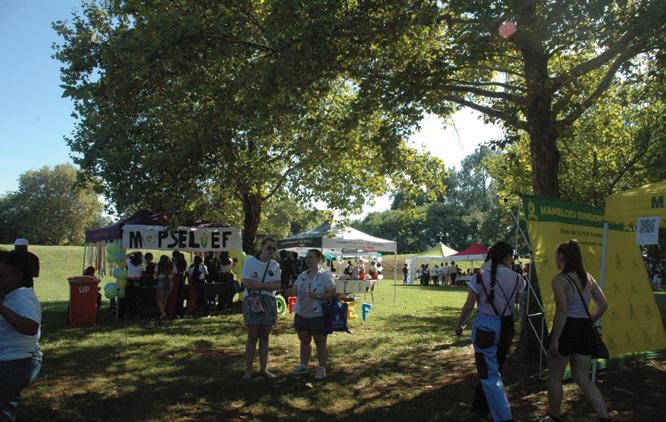
After the recent United States–Africa University Partnership Initiative Summit, US arts institution Guilford College and the University of Pretoria signed a memorandum of understanding to allow exchange opportunities and research collaboration. This partnership is especially significant for the university’s African Global University Project, a strategic initiative that seeks to increase the reach and relevance of the university through their collaborations. Furthermore, the partnership will aid in positioning UP as a Pan-African Institution.
UP honours top matriculants at conference
The Welcome and Leadership Conference is a three-day event that celebrates the top matric achievers who chose to study at the university. It saw Emily Jane Hawkes and Christelle Jones, among others, receive the University of Pretoria’s Vice-Chancellor’s Distinguished Merit Award. Recipients are invited to a unique leadership programme that develops leaders to solve complex problems in organisations and cities.
4 | News 10 March 2023
www.pdby.co.za to download our rate card or contact advertise@pdby.co.za
Banathi Nkehli
Image: Katharine O’Ehley
A NIGHT OUTSIDE THE PALACE
SRC LEADS A DEMONSTRATION AGAINST THE NSFAS ACCOMMODATION CAP
Banathi Nkehli and Kirsten Minnaar
On 16 February, the SRC organised an independent demonstration against the NSFAS (National Student Financial Aid Scheme) cap of R45 000 per annum on private accredited accommodation. The past couple of years saw a steady increase of funds that resulted in 2022’s R60 000 accommodation allowance. While the decrease itself was drastic, what was more alarming was that NSFAS did not communicate with affected parties. The change in policy direction has affected approximately 6 000 students, leaving them without accommodation or with potential debt. As a result, the demonstration entailed that students sleep outside 90 Duxbury Road in solidarity with students affected by NSFAS’s decision.
Left to sleep outside – Students affected by the Accommodation Cap
Following exchanges with NSFAS through the university, the UP SRC released a statement on 15 February, which read, “NSFAS has rejected the accommodation cap exemption application and as such… the accommodation cap will be implemented as proposed by NSFAS policy.” In addition, the statement elaborated further on an emergency meeting that would be convened between UP management and the UP SRC on the morning of 16 February.
On 16 February, the UP SRC released another statement which began, “After today’s meeting with the executive management [of the University], we have realised that there is no solution to the accommodation crisis on the University’s side. The proposed solutions that we tabled were deemed impossible to achieve because of major issues including major legal battles with private stakeholders.” On the same day, a poster was uploaded to the UP SRC Instagram stating, “The SRC is holding an independent demonstration against the NSFAS cap, please join if you stand in solidarity with affected students. The demonstration is at Duxbury 90…” The notice on the poster stressed, “The SRC is not affiliated with any political structure.”
The demonstration
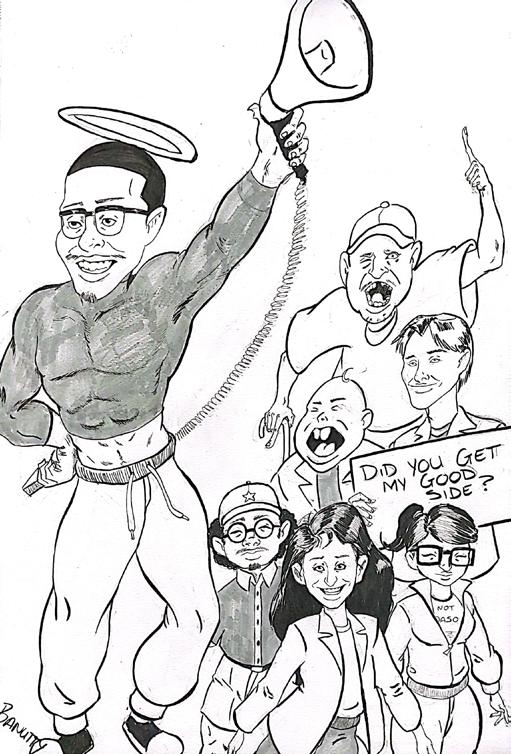
The demonstration took on a simple but provocative form; the idea was that students participating would sleep outside the TuksRes offices on 90 Duxbury Road as an overt statement on student homelessness caused by the NSFAS cap. Mattresses were provided, alongside some rudimentary food and water for those participating.
The event saw participation from a wide array of students acting in different capacities; chief among the participants was the incumbent chairperson of the Democratic Alliance Students Organisation (DASO), Shaina Moses. When asked to explain her reasons for being a part of the protest action, Moses explained, “DASO took part in the demonstration to stand in solidarity with students who are affected by the NSFAS cap. Witnessing our peers feel hopeless at the thought of not having a roof over their heads is something that DASO cannot and will not allow.”
Speaking on behalf of the organisers of the demonstration, SRC President Njabulo Sibeko explained the SRC’s participation: “We are standing in solidarity with students who don’t want to put their parents in debt, or to force themselves into an agreement that they cannot uphold. We are here for the students who just don’t have a plan B… We are trying to raise awareness to let the world know that the University of Pretoria is allowing their students to sleep outside and be homeless, TuksRes has no space, and placement isn’t taking any more people.”
Was the demonstration political? / Was it partisan? / Neither?
A constitutive question that surrounds the discourse concerning the demonstration is whether this was a ‘political’ demonstration. This question is not unfounded given the overt partisan presence on both days of the demonstration. On the first evening of the demonstration, students were seen in Economic Freedom Fighter Student Command (EFFSC) regalia, and Moses, in her capacity as chairperson of DASO, was wearing DASO regalia. This is in spite of the notice put out by the UP SRC. The following morning, other political actors could be seen gathered in the surrounding area of Duxbury Road and Prospect Street in full political regalia; these actors included the chairperson of Action SA’s UP Chapter, Moses Modisane, and SASCO members. When asked about the partisan presence, Shaina Moses said, “Essentially, the demonstration was/is for all students to attend. Politically affiliated or not. However, the objective of the demonstration set out by the SRC had to remain the same for all – stand in solidarity with the students affected by the cap.”
Adding to the confusion concerning the political or, more accurately, partisan confusion, the EFFSC sent out an email and posters. The posters read, “Join the EFFSC UP TuksRes offices shutdown to demand the revoking of accreditation for private accommodations above the NSFAS cap.” The address listed was also 90 Duxbury Road. The email went into further specifics, and also stated, “Revoke accommodation accreditation.” The additional information in the email included an allusion to the registration crisis, where students cannot afford to pay the registration fees for the 2023 academic year.
The impact of the partisan confusion could be felt in the absence of UP’s residence structures, who withdrew their support upon discovering the EFFSC’s emails and posters.
The outcome
The outcome of the protests was a response from the University of Pretoria, posted on 17 February, as well as a statement from the Feenstra property group, which owns accommodations like Studios @ Burnett and Hatfield Studios. The University stated, “The University of Pretoria is disappointed in NSFAS’s rejection of the exemption application made by the University…The University of Pretoria is not in a financial position to fund the difference between the actual and capped amounts.” In response, the Feenstra property group sent out an email stating, “We agree to make a concession to rental rates of specific room types addressing the capped NSFAS rate… We urge students and the University of Pretoria to join us in the discussions with NSFAS as we seek to find a long-term sustainable solution.”
In addition, Respublica Life made a similar announcement: “Respublica’s rental rates at Hatfield Square, Eastwood Village and Urban Nest will be temporarily revised to accommodate as many NSFAS students as possible.”
10 March 2023 News | 5
This article has been edited following errors in the print edition.
Cartoon: Banathi Nkehli
A pattern of systematic failures, sub-par living conditions and futile protest actions
Kirsten Minnaar
For many students, the recent announcement of NSFAS’s annual accommodation cap of R45 000 has caused a wide array of emotions among students. Whether it made students anxious about their living arrangements for the coming academic year or fearful about their financial ability to continue their studies. Worse still – for many students, this cap and the subsequent demonstrations simply feel familiar. Students from poor backgrounds have been made to suffer and fight for their education for many years, with no sign of any sustainable solutions.
Student homelessness
The National Student Financial Aid Scheme (NSFAS) set an annual cap of R45 000 on private accredited accommodation for university students, affecting approximately 6 000 UP students. The SRC participated in exchanges with NSFAS through the university to try and resolve the matter, but to no avail. Following these negotiations, they arranged a demonstration where participants slept outside the TuksRes offices on 90 Duxbury Road. The message of this demonstration was clear: no student should be left homeless because they cannot afford to pay for accommodation. On 18 February, the SRC released a statement wherein they announced a set of “temporary solutions”. This was followed by them suspending the demonstration action since the “SRC is convinced that no student shall be left unhoused”.
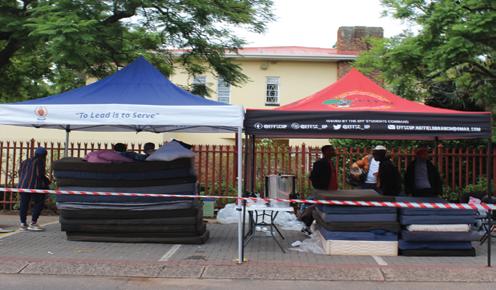
While this comes as a great relief to many students, student homelessness is an issue that long preceeds the NSFAS cap. In 2017, ENCA reported, “Thousands of students countrywide are homeless on campus, having to squat in an office, a library, or even toilets.” They referenced the Department of Higher Education, which estimated that “around 216 000 students are without suitable accommodation, and almost 400 000 beds are needed to meet government’s enrolment targets for 2030.”
At the time, students from multiple universities were forced to squat everywhere from university toilets to a building which has been set alight during the Fees Must Fall protests of 2015.
Living conditions
Quality of living is another student issue that has stood the test of time. Although it is easy to brush aside, poor living conditions can,
at best, be an annoying inconvenience, and at worst, be a serious health hazard. The Report on the Ministerial Committee for the Review of the Provision of Student Housing at South African Universities of September 2011 found that there were widely varying standards for housing university students. A large number of accommodations were found to be sub-standard, and the lack of adequate food was noted as being a particular challenge for most students living in residences. This report formed the basis of the 2015 policy on minimum norms and standards for student housing at public universities (which forms part of the Higher Education Act). However, despite the introduction of this policy, quality of living still remains a real issue for many students. PDBY spoke to Nothando Mhaule, who lived in Apartments on Williams in 2021 and 2022, about the living conditions she experienced living in a NSFAS-accredited accommodation in Hatfield. “The living conditions are horrible. I wouldn’t recommend anyone living there at all.”
She explained that the building’s amenities were often not in working condition. “If the elevator breaks over the weekend, they don’t fix it until Monday morning, or until the house manager deems it urgent enough, and there are a lot of students. There are over a thousand students that live there. I remember last year there was a time where they came to say to us we’re using too
much water, and they’re going to start making us pay for the water and that’s not in our lease[…] And I know if there’s no electricity, the water can’t run as well. Sometimes we would have no water for two to three days. How can you come to campus when there’s no water? We would struggle with stuff like that. The Wi-Fi would just disconnect when you are writing a test. I remember there was a time last year when I had an assignment and we had to get a letter to show the university that I had Wi-Fi problems.”
She also explained that administration, finances, and hidden costs were a real struggle. If they wanted to replace their microwave, they were told that it would be subtracted from their deposit, despite the fact that they were not responsible for the damages. who damaged a certain thing.
For any random person, they would just subtract it from your deposit[…] I remember the first time I got my deposit back I got R450 out of R1000.” When enquiring as to why she did not receive her full deposit back, they claimed it was because of damages that she was not responsible for. They also had to send their refund applications multiple times. “Ever since I sent my refund application there’s nothing I’ve gotten from them except the fact that the main guy I communicated with in regards to my rent and deposit has been fired, and they didn’t even
explain why”.
Protest action
Student protest action in South Africa has a long and tumultuous history. The Fees Must Fall movement of 2015, in particular, comes to mind whenever the topic of student protest action is raised. This protest, where students were fighting against increasing university fees, was the biggest student protest action since apartheid ended in 1994 and resulted in an estimated amount of R800 million to R1 billion in property damage, numerous casualties, and hundreds of arrests. According to the Global Citizen, “On Oct. 23, former president Jacob Zuma announced that there would be no fee increases for 2016. The Commission of Inquiry into Higher Education and Training, whose role it is to find and create opportunities for free education at tertiary institutions, was formed soon after.”
Despite these “solutions”, protests among South African students never ceased. As recently as 2022, the UP SRC, along with other students at the university, partook in demonstrations against the University’s registration fee increases for 2023.
Free education is still not a reality in South Africa, despite endless pleas and protests from students and promises from government officials. Students are still protesting and demonstrating against the exact same issues that students fought for almost 8 years ago. For some reason, however, finding sustainable solutions and implementing actual systematic change does not seem to be a priority for those with the power to do so.
If history is to be any indication, poor students will continue to suffer in the ways that they have done in the past. Progress is either slow or non-existent, and promises for change never quite seem to come to fruition. Poor students have to endure endless challenges, from the threat of homelessness and terrible living conditions, to dealing with historical debt in the midst of perpetually increasing university fees. Student demonstrations and protests only end with temporary or inadequate solutions – or no solutions at all. At best, students who participate get a false feeling of enacting change, and at worst, are left feeling even more hopeless than before. No matter how much time changes, the same sentiment seems to remain true: no one cares about poor students.
Punk’s Not Dead, Again: Womxn and People of Colour in Punk Rock
Ayesha Osman
Over the past two decades, the popularity of punk and alternative music has ebbed and flowed. Oftentimes, the focus has been on white men woefully screaming about their ex-girlfriends, but the latest resurgence, has brought attention to female-led bands and artists, as well as to the influence of people of colour in the industry.
Historically speaking, punk and its eventual successors punk- rock and punk- pop, have been known to continously push the boundary of what is considered ‘normal’. The London underground music scene was characterised not only by their rebellious attitude, but also by their progressive stances on human rights issues like race and sexuality. That being said, the genre as a whole has still lacked both female and black voices within the genre.
Moving into the 21st century, bands such as Blink 182, Green Day, New Found Glory and Simple Plan defined punk music as a breakaway from the norm, creating catchy, sad and emotionally charged songs about heartbreak and the woes of society. But while

they were picking up this torch, something got lost in translation from the London pink scene to the American iteration of the genre. Amongst these rebellious men, there were still womxn (an inclusive term for everyone who identifies as a woman) who were trying to be heard above the din of older men in the genre.
Paramore singer Haley Williams has mentioned this countless times in interviews and speeches, stating that she has had her fill of older men telling her what punk rock is. She has also stated, “The scene was not always a safe place for you to be different.” , something that was especially evident if you were a womxn.
In recent years, artists like WILLOW and Olivia Rodrigo have taken the spotlight and redefined what it means to be “punk rock”.
Rodrigo’s SOUR was the longest-running debut album on the Billboard Top 200 charts, sitting at number one for five non-consecutive weeks.
While WILLOW has used pop-punk to deepen her emotional and spiritual holds. Her music has also brought attention to the black roots that punk and other rock genres have, which have been ignored or hidden in the past. Her mother’s nu-metal band, Wicked Wisdom, which formed
in 2002, has faced this exact racism at festivals like OzzFest.
This erasure is also seen in the Grunge subgenre. Bam Bam was one of the most influential and leading grunge bands before the genre was even defined. The lead singer, Tina Bell, holds the title of the “Queen of Grunge”. The #BlackLivesMatter movement brought attention to this band and the singer, who did not conform to the normal look of an alternative-music lead singer. Bell was a recluse and former church singer, and her grunge songs took influence from black culture and music. Her influence is seen in the music of white male-led bands such as
Soundgarden and Alice in Chains.
All in all, Gen Z is redefining what it means to be “punk rock” by allowing women and people of colour the same spotlight as the typical “punk rock dude”. They are highlighting the influence of the black community within the genre and creating a safe space for anyone who is labeled different.
10 March 2023 6 | Features
Matresses used by students during overnight demonstration
Image: Katharine O’Ehley
Gen Z is redefining what it means to be “punk rock” by allowing women and people of colour the same spotlight as the typical “punk rock dude”
#Local Is Lekker Expensive:
The cost of sustainability
Vuyiswa Fumba
Boycott Shein, boycott Mr Price...and H&M, Cotton On, and PEP! Factory workers are sewing “help me” on the inseams of fuzzy sweaters, which has sparked an overwhelming feeling of consumer guilt as well as online discussions about responsible parties and possible solutions. The topic of fast fashion continues to gain traction, and many consumers have been awakened to the effect of their shopping choices. “Did you really think you could buy a graphic tee for R40 and nobody was suffering in the process? How are they all getting paid?” Haibo! Is everyone responsible? What is the solution to this issue that is deeply affecting workers’ lives and wellbeing, and the environment? Most pressingly, should I burn my Shein order when it arrives, or return it to the sender?
PDBY interviewed final-year BConSci (Clothing Retail Management) student Kiara Watchorn on the topic of fast fashion and the shift toward sustainability. She defines fast fashion as cheap, trendy, poorly-made clothing that goes in accelerated cycles of mass production and disposal. The nature of fast fashion is to respond to rapidly changing consumer tastes as quickly as possible. This causes several ethical concerns, like the negative effect of overconsumption on the environment and the question of whether or not workers are being paid liveable wages.
How does fast fashion affect the regular South African shopper?
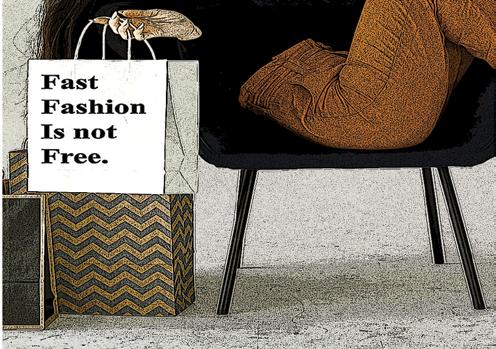
“It can affect them in two ways. Most of the time for a regular South African, fast fashion is the only way to get clothing. It makes buying clothing accessible to everybody and gives them choices between different styles to find the best option for themselves. Oftentimes, people buying fast fashion will use those items for a long time, so it becomes technically beneficial to the average consumer. It is an affordable option for most people in South Africa, and in this economy you cannot expect people not to support fast fashion.”
However, the negative effects include the depletion of the production of clothing within South Africa, which has resulted in job losses. There is the environmental aspect – the fashion industry is one of the biggest polluters in the world. Regarding this, the World Economic Forum estimates that 10% of global carbon emissions is caused by the fashion industry.
Furthermore, textile dyeing is the world’s second-largest polluter of water because the water is often dumped into rivers. Ultimately, the rise of fast fashion only exacerbates these negative environmental effects.
How can people minimise the harm caused by their fashion choices?
Watchorn suggests building an adaptable wardrobe: find a pair of good jeans, plain t-shirts, clothes that are versatile, can be worn often and for a long time. Thinking of new ways to wear the clothes you already have will help you keep them for longer. Figuring out your personal style will help you consume less because you will not just buy everything. “Look at where your clothes are made. If you are at Mr Price or Pick ’n Pay and you see that the clothing was made in South Africa, rather than China (for instance), rather buy that because at least it is supporting the South African economy. Rather Mr Price than Shein. Though they are both fast fashion brands, there is always an option that is the lesser evil.”
Watchorn also advises learning to repair your clothes instead of throwing them out if they are
still in repairable condition. Not only can you keep your favourite items in your closet for longer and save money, but you can also help minimise the environmental effects of constant buying. Think about where your clothes are going after you are no longer wearing them. If there is an old top that cannot be reworked to wear again, it can be used as a rag. If the clothes can be upcycled to create something new, like a skirt from an old jean, there are many guidebooks or YouTube videos that can teach that skill. If the clothes are in good condition, consider donating them. In 2022, Fly@UP facilitated a thrift drive where students could drop off unwanted clothing items in bins across campus, and later students who wanted to shop for preloved clothes could do so free of charge. In the sustainable fashion model, everything works cyclically, so an old T-shirt that has outlived its use is recycled and made into a new T-shirt that will last for years and add value to the life and closet of its wearer.
“Lastly, think about the people making your clothes. Sewing is a skill that takes considerable effort to learn, and there is a need being provided
for. Whereas other professions are paid a respectable living wage (plumbers, bankers, etc), the people who make the clothes that every human being wears are often subjected to horrid conditions and peanuts’ worth of pay.” Some companies take the initiative to forthrightly state their sustainability strategies, while others opt not to. It is up to each person to choose whether sustainability is an important factor of their consumption choices.
What would you say to people who do not think they have a role to play in this discussion?
If the fast fashion industry continues to gain traction the way that it has in the past few years, job opportunities will continue to lessen and everyone might be personally affected at some point. Still, it is important to consider the real people who are affected by your fashion choices. Watchorn said, “I like to ask people to imagine themselves in that position, and the reality is that if you do think of it, it doesn’t affect you. Just like if you don’t think of it, it does not affect you at all. But it can affect the person that makes the clothing items. So if consumers choose not to support a certain brand because they pay their workers poorly, then maybe they will start paying them fair wages due to consumer influence. That is the best that can happen, and the worst that can happen is that you don’t have that T-shirt.” If we have an individualistic “it’s not my problem” mindset, then we cannot expect other people to care when we are on the other side, needing their help. Watchorn added, “If people stop caring about each other, then what’s the point?”
In an interview with John Maytham of 702 radio, Mark Sumner, a sustainability lecturer at the University of Leeds, commented that clothing is not only necessary from a modesty standpoint, it is also really important as a means to demonstrate who we are and communicate about our lifestyle. We use it as non-verbal cues for our status, state of mind and our position in society. Conversations about sustainability often lead to objections about how expensive sustainable brands are, but ethical consumption starts with what you have and not what you have to buy. Maximising the use of the clothes you already own, donating what you do not use, and researching sustainability efforts of brands before you shop are great ways to inch towards sustainability without paying R1200 for a cropped denim jacket. However, if the jacket will last five years, maybe then R1200 will be worth it?
The Law student whose name is Marcus? You seem like a gym rat and you barely come to lectures. I’m not looking for anything, just needed to let you know that I simp! Please come to more lectures though, I need some motivation to attend class <3.
Hi Morgan, you might not know this, but you have a secret admirer. Over the past months I have suffered alone in silence with hopes that you would finally notice me, but unfortunately for me, you never did. So this is my attempt in letting you know that I would appreciate it if you would agree to go on a lunch date with me. Maybe we could also be study buddies since we are both studying electronic engineering. Hit me up.
Hello, crush. I just smiled the minute I saw you. I find you interesting and you’re so gorgeous, man! I saw you at the Piazza on the 16th of February 2023 (Under TuksFm) and I think you and I would make a great couple. You were wearing star black (black t-shirt & a black jean), blue Vans (Blue & White), and you have short hair. I’d appreciate it if you could reach out to me. We can go on a date or something. I hope to see you again crush, bye.

10 March 2023 Features | 7
Visual: Masehle Mailula
“If people stop caring about each other, then what’s the point?”
Image: Provided
Day in the Life: Professor Tawana Kupe
Vuyiswa Fumba
Prof. Kupe is a prominent figure at the University of Pretoria. Not only in his position as vice-chancellor and principal of the institution, but also due to his many interactions with students who have either come across him on campus or at various UP events. PDBY spent a day with Prof. Kupe and gained insight into his life and how he spends his days.
Prof. Tawana Kupe is a Zimbabwean-South African scholar. He started his tenure at the University of Pretoria in January 2019 and is widely published, boasting several articles and journalistic contributions. Prof. Kupe has garnered many accolades to his name, including most recently, being appointed a Knight of the French Legion of Honour in February 2023.
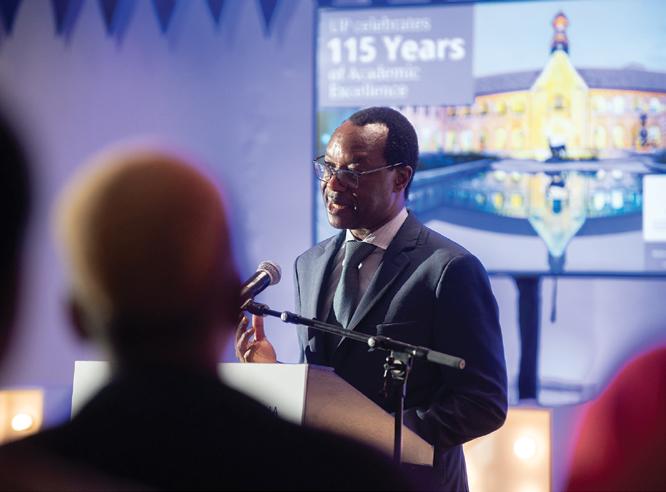
Prof. Kupe spends his mornings conducting and participating in meetings that are often accompanied by long agendas. At these meetings, he has to make extremely impactful decisions on a variety of matters, ranging from the management of the official UP social media pages and arrangements for Giving Day, to plans for the Health Sciences Faculty. His job includes overseeing the large-scale happenings at UP and coordinating between departments to ensure the smooth running of the institution.
When asked what time he usually clocks out of work, Prof. Kupe explained that it is not a normal 9 to 5 and that the amount of hours differs every day. Some days he might leave his office at 17:00 to head home and others, he might have an event to attend in the evening. This is one of Prof. Kupe’s favourite things about the job: no two days are the same. He explained, “The joy of the job lies in the diversity of experiences and people I come When asked about the most interesting person he has met through work, he responded, “It’s very diverse, from first-year students excited to start their university journey, to postgraduates, to the athletes on the sports campus who have won Olympic medals.”
Prof. Kupe cannot imagine a job with the same amount of freedom and the same opportunities to interact and connect with such diverse groups of people. Here he gets to work in myriad locations and make speeches before crowds in different situations. across on a day-to-day basis.”
It’s party time - What a month ahead

 Franco Marais
Franco Marais
With a third of March already done and the first semester well underway, there are a few essential dates that need to be jotted down by those who wish to take a break from the impending academic doom and make the most of the remainder of the month.

For those who like a tamer affair than a wild party night and enjoy a cozy neighbourhood environment; Olympus Village Night Market is happening on 10 March from 16:00. Entrance is free and there will be food, drinks, live entertainment and general arts & crafts. If you are a dog lover and want to bring your four legged friend along, you are more than welcome to, as long as it is on a leash. For music lovers, Rainbow Kitten Surprise will take to the stage at Marks Park on 11 March. Those who are looking for tickets will need to fork over R450, but any fan of the band will tell you it is more than worth it. Other
acts that will also be sharing the stage with them are Spoegwolf, Shortstraw and Mann Friday.
Then, the big one – St Patrick’s Day. On 17 March, Jack Parow will perform at Parkview Shopping Centre for an entrance fee of R80. Then HBC Taproom will be hosting a St. Patrick’s weekend event from 17 March and ended on 19 March. There will be live music on the 18th as well and entrance is completely free for both people and dogs. If non-rap live music is more your thing on this Irish holiday, then Runaway Train Cult will make an appearance at Thirst. Capital Craft will be doing their own celebration of the day on 21 March. They will have green beer for all who come, but they do ask that you book a table in advance.

Once St. Patrick’s day celebrations have passed there is another up and coming event for the classy drinkers on campus. The Pretoria Gin Festival is happening on 25 March and tickets are sold

at a crisp R220 and this includes a complimentary gin cocktail on arrival. The hosts of the event highly encourage attendees to bring their camp chairs and picnic blankets along with their friends. On the same day, Homecoming Events is hosting Hatfield Freshers at Hatfield Plaza. Entrance is R150 and includes performances from artists such as A-Reece, Kabza De Small, Mellow & Sleazy and many more. Finally, the Voice@Sunset is being hosted on 26 March. With this eventful month, there is no reason to stay at home. Go out and see which of these events are for you!

10 March 2023 Features | 5
Images: Cletus Mulaudi
The Student’s Guide to the Jol
While skills such as downing drinks, dancing your heart out, and holding your friend’s hair in the bathroom while they puke out their guts, can be adopted as naturally as brushing your teeth, there are some skills that are trickier to adopt into your safetyfirst vocabulary, and the consequences of not taking on such skills are far more severe. As young adults, we have had to bitterly develop these skills to make it home at the end of the night, and there are a few essentials that should never be forgotten. This summarised handbook of tips and tricks comes with years of research and experience and is written with the hope that that phones will not be stolen and lives will be saved.
Rule number one:
Live location is your best friend. When surrounded by flashing lights, funky music, and new people, the group you arrived with is very likely to disperse into the night. There is no shame in seeking the unknown, but make sure that your location is known by at least one other trusted person. Before ordering the Uber with your friends, make sure you have all gone on WhatsApp, clicked the location button, changed the duration to eight hours, and sent it to people you trust to help locate you if you go missing. It also comes in handy if a friend walks off to Uncle Faouzi’s for some chips without any notice.
Rule number two:
Only take one ID out with you.
Unfortunately, theft has become a
regular occurrence outside most bars and clubs in Hatfield. Having your wallet or phone stolen from your person is bad enough, but having your ID and driver’s license taken from you simultaneously is a doorway to the Home Affairs nightmare. Before leaving the house, make sure wallets or phones, ideally, only contain your student card, in case your age is questioned.
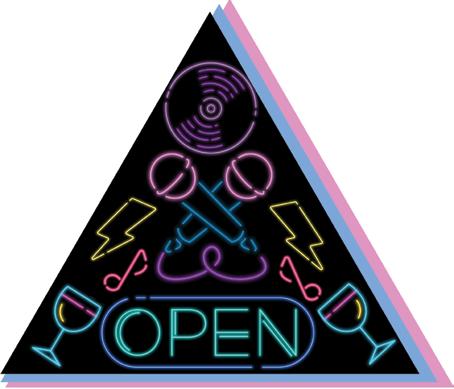
Rule number three:
Familiarize yourself with the exits in case of an emergency. While the dance floor is mostly filled with harmless sheep, wolves are searching for open drinks to drop secret chemicals in, that will make their hunt easier. These wolves and their traps tend to go unnoticed, but the side effects of their visits do not. The moment you begin to experience drowsiness, impaired speech, loss of balance, and blurred vision, it is imperative that you go to a friend, or someone dancing next to you, and tell them immediately. If you find yourself at Jolly
Roger’s, ask this person to escort you to the bathroom in case your symptoms worsen. Jolly’s holds the crown for safety measures in case this happens, as they have installed red panic buttons in every stall. Pressing these buttons alerts the staff and they will bring you water and assist you to safety. If you are in any other bar or club, ask your safety buddy to assist you to the bar, inform a staff member of your situation and ask if you can sit behind the bar (remaining in public view) until you can get home safely. Do not wait outside your palm before you even on. It is always best to walk with your phone in your pocket and covered with your hand. But if you find your phone is being taken
Although fighting for your phone might get you out of trouble with your parents, the wolves will not hesitate to fight for it. Fighting for your phone could lead to hospitalisation for stab wounds, gunshots, or death. Remember that your life is worth more than your phone, and that even though your parents might moan at you, they will get other it. Your family and friends will never move on from the loss of your life.
Rule number five:
Always check the boot. While Uber brings comfort in knowing that you do not have to worry about drinking and driving, or how you will get home, it comes with its own risks and rules. When you see your shining knight in transport, remember to take off their armour and check their identity. Begin with the number plate, making sure that it matches the one provided to you on your app. Then move to the driver; before getting into the vehicle, ask the driver for their name and the name of the account that placed the order. This is the only instance where ‘No’ is an unacceptable answer. If your knight has passed these tests, check the boot to avoid any Trojan Horse attacks. It is not uncommon for a wolf to sit in the boot and bide their time to attack.
While going out and meeting new people is an essential part of the varsity experience, it is important to learn these tips and skills to ensure you go on to have all these experiences of life safely.

Introducing ‘Mooting’: African Moot and the UP Moot Society
The UP Moot Society recently hosted a film screening of the acclaimed documentary African Moot in the Centre for Human Rights building to promote the centre’s legal work in human rights in Africa. The society, which works closely with the Centre for Human Rights, participates in ‘mooting’; in other words, they compete against other university teams to debate issues of human rights in a simulated court environment.
African Moot follows several teams of law students from across the African continent who converge at the University of Botswana to participate in the African Human Rights Moot Competition, or the ‘African Moot’. The students must debate the issues of refugee and LGBTQIA+ rights in two fictional African countries. Competition is fierce, which leads to several tense moments between contestants that will be impactful even to an audience who is unfamiliar with mooting. The documentary also raises many important points about refugee rights, LGBTQIA+ issues in an African context, and the idea of ‘pan-Africanism’ as a whole. All in all, the documentary delivers an engrossing look into the lives of African law students, their personal and professional struggles, and the issues that they study and debate in order to carve a better and more equal future for all African citizens.
The UP Moot Society will represent the university at this year’s African Moot, which is to be held in Ghana. Any prospective lawyer who wishes to leave their mark on the legal world would be welcome in the society. Those who are interested in a gripping look into the future of human rights work in Africa are encouraged to seek out African Moot on the free streaming service afridocs.net.
10 March 2023 Entertainment | 9
Image: Sharon Dumba
Visual: Katharine O’Ehley
Rebecca van Besouw
Danielle Yeatman
Crossword

Across
3. Unscramble the anagram for the name of a famous actress: bridge glow hoop
4. Magical cup sought after in Arthurian legend
5. Longest bone in the body
7. Animal on R100 note
8. Bird with a loud call typically found on campus.
12. Another name for a murder mystery.
14. Gemstone sought by Jacques Clouseau
15. Liquid courage
Down
1. Greek figure who continuously rolls a boulder up a hill
2. Fear of spiders
3. Day of the week and name of a Netflix series
6. Arcade game with a yellow protagonist
9. Name of PDBY’s editor
10. Property game that has ruined many a family
11. Name of a flower and a national South African sports team
13. Scientist who formulated the laws of gravity
10 | Fun and Games 10 March 2023
APPLE APRICOT BANANA DRAGONFRUIT FIG GRAPE GUAVA KIWI LEMON LITCHI MANGO NECTARINE ORANGE PAPAYA PEACH PEAR PERSIMMON PINEAPPLE PLUM RASPBERRY STARFRUIT STRAWBERRY TOMATO WATERMELON
W T A E P W K L Y O U G P D Y S O G N A M I Z R E X A Q R R L I T C H I W L R I P N T A R A R P L E S I S P A O P O G E T P B G Y Z T E Y L T L M O B O O X G S R R A E F E A A N P Q L C Q S S R M R L I M T F S O G Q I I N R E P F C G O R A A R U M R E L P B W R W T U R N I M A T P A E H W H U L I O A O K A V E A N M L A I I T O N T W H N A Y W B O P R W T P A S P I O R A N G E N X T M L B E P A R G U X A N S T J S U A P N E C T A R I N E Q T R M APPLE APRICOT BANANA DRAGONFRUIT FIG GRAPE GUAVA KIWI LEMON LITCHI MANGO NECTARINE ORANGE
Kicking off the Varsity Cup
Franco Marais
It is that time of the year again when rugby fans and socialite students pour into the stadium to indulge in the incredible atmosphere of the Varsity Cup.
Tuks had a lackluster start after losing their first three games 26-25, 40-19 and 41-39 to Shimlas, Ikeys and CUT respectively This means the tournament is well underway and UP has had nothing but heartbreaking defeats. That’s why UP has no choice but to look to the rest of the season and what can be expected from future sporting events.

As the first kick-off took place on 20 February, UP students came out in droves
even with the sky drizzling away. The grey clouds appeared to have been an ill omen as in the first quarter of the game, Tuks saw themselves three tries down. That is when they dug deep and battled for every meter in a thrilling test of strength. This all boiled down to one final kick to decide the outcome of the game. Then, something rather rare for rugby happened and the conversion kick was called off due to the kicker taking too long. This led to the final score resulting in a 25-26 loss for the defending champion.
Afterwards PDBY spoke to Tuks skipper, Lincoln Daniels, to get his thoughts on the game and the season going forward, “Rugby is just like life. You win some and you
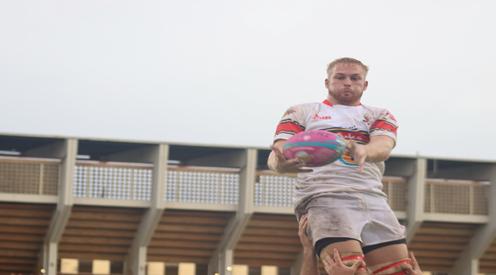
lose some but I’m very proud of the boys. I’m proud of the fight for the whole eighty minutes. We started off slow but saw what we did wrong and fixed it”. Unfortunately, UP then went on to suffer a horrible defeat to Ikeys in the second game week and a narrow defeat to CUT. These strings of losses have leaves UP at the bottom of the table. Leaving a massive mountain to climb, for the rest of the season as they try to secure a spot in the playoffs.
Looking forward to the upcoming season, it is jam packed with salivating fixtures. A massive home game against NWU Eagles on
Recess Recap

Christiaan Steenekamp
With Messi lifting the FIFA World Cup trophy, Eastern Cape Sunrisers winning the inaugural SA20 cricket league and Marcus Rashford in the form of his life, this past recess delivered a lot of entertainment and memorable moments. If you have somehow missed these events and are looking for a quick recap, this article is exactly what you need.
Firstly, we will look at the Men’s FIFA World Cup. The highlights include a controversial Netherlands versus Argentina match, Harry Kane’s crucial penalty miss against France, Morocco’s unbelievable feat to finish fourth and Mbappe’s stone cold scoring sensation in the final.
The SA20 Cricket League attracted tens of thousands of supporters resulting in a festive atmosphere around all the stadiums in South Africa. Sunrisers Eastern Cape won against Pretoria Capitals with 14 runs in the final. The Women’s T20 Cricket World Cup finished with our Women’s team making it all the way to the final, where they unfortunately lost against tournament favourite Australia by 19 runs. The Indoor Hockey World Cup saw the SA women’s team ending fourth and the men’s team losing in their quarter-final match.
In the Premier League we saw Manchester United leapfrogging to the third place on the leaderboard with Rashford at the forefront of their success. Arsenal was, and still is, constantly battling with Man City at the top of the table, with Chelsea in the tenth position after their behemoth 270-million-Euro expenditures lacking to pay dividends in wins. In the ongoing Champions League we saw Real Madrid going from a score of 2-0 down to winning 5-2 against Liverpool.
In the URC, the Stormers are on top of the SA Shield. There are only a few more rounds


left to play with the Stormers, Bulls, and Sharks participating in pivotal positions in the top eight to ensure a spot in the playoffs. Finally, during the Australian Open we saw Novak Djokovic winning in three straight sets against Tsitsipas,
claiming his record-breaking tenth Australian Open title. An absolute machine! And that concludes your recess recap, but the action and drama will still continue, which gives us more insane sport entertainment.
13 March, then clashing horns with Maties the following week, and ending the group stage games on home soil against UJ. For all these up-and-coming fixtures we, at PDBY, will be covering each game and posting it to our online platform for those who missed the game. We will also be covering not only the Varsity Cup but also the local res leagues of various other sports here on campus in exactly the same fashion. So, if you missed a vital game or want to know what has been happening with your res on the field, feel free to check out our online side of things to keep up with all the sporting action.
10 March 2023 Sport | 11
Image: Katharine O’Ehley
Image: Masehle Mailula
Image: Masehle Mailula
Sport

‘Rag-arific’ Sport

What started as a cool morning turned out to be a warm sunny day on 25 February –UP RAG Day. As part of the multifaceted day, there were three official sport events for the residences, day houses and societies to participate in. The first event was called “Goal Ball”. This event was a new addition to the RAG Day sports arsenal and turned out to be a fan favourite. At the event, three members per team were blindfolded on a cement floor, and the players were given a ball the size of a soccer ball that had jingling bells inside to alert players as to its location. In order to score, each team relied on their hearing ability to find the goal box and skid the rolling ball into the net. The defending team also needed to have their wits about them to try and block goals. It took some getting used to, but in no time the teams were playing as if they had done so for years. Ultimately, College and Nala secured first place with a win over Tulips.
As the goal ball games concluded, the day’s action continued with the touch rugby and football events. Many teams in unique uniforms battled it out on the fields to secure the win. During the touch rugby, there were some great behind-the-back and looping skip passes, which led to some classy tries.
The football event was the highlight of the day because fans showed up in numbers to support their favourite teams. For this particular event, there was no overall winner, but plenty of players displayed their prowess on the field and scored some stunning goals. In a final display of strength, a game of tug of war was the last event of the day. Two teams were pitted against each other to see who could pull their team to victory.
The sports at the UP RAG Day were fun, and a lot of people came to support their residences and societies. However, there were technical issues, with the fixtures starting later than originally planned. You win some and you lose some, but everyone was brought together by their love of sports.
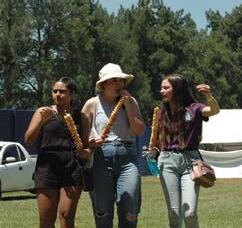
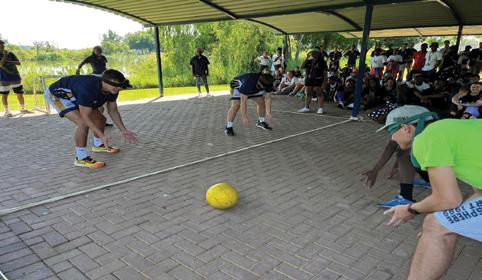
Life is a ball
Living well through sport
With the Varsity Cup underway, and the supporters ready to come in and cheer for their favourite team, it is time to ask the real question: does getting involved and being an avid supporter have any influence on our psyche?
Professor Daniel Wann from Murray State University conducted a study centred around sport fandom, and he found that sports fans have higher levels of self-esteem. His study also suggested that sports fans are more satisfied with their lives compared to those who are not interested in sports. Supporting a sports team is also linked with togetherness, as could be seen during the 2022 FIFA World Cup, where 1.5 billion people watched the final between Argentina and France. This ‘togetherness’ reflected positively on the sports community and showed people coming together to shatter pre-existing records.
Being a sports fan allows you to reap positive benefits and, according to Wann, it provides the “ability to bask in the team’s successes”. When your sport team wins, it feels exhilarating, as though you yourself were participating, which results in a positive mood overall. Sports fans usually reflect these claims, because when they go to arenas or stadiums to show support, they wear their teams’ merchandised clothing and sing dedicated chants. These types of fans are usually referred to as “Ultras” in football, and their fanaticism is usually displayed in the form of flares that cover the stadiums in smoke.
With the Varsity Cup underway and other university-related sports still coming up this season, be sure to pick your favourite team and be part of an ever-growing community.

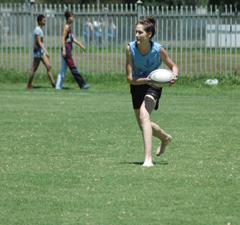 Image: Katharine O’Ehley
Mpho Mabelesa and Christiaan Steenekamp
Photo: Sechaba Ntshehi
Mpho Mabelesa
Photo: Sechaba Ntshehi
Photo: Sechaba Ntshehi
Image: Katharine O’Ehley
Image: Katharine O’Ehley
Mpho Mabelesa and Christiaan Steenekamp
Photo: Sechaba Ntshehi
Mpho Mabelesa
Photo: Sechaba Ntshehi
Photo: Sechaba Ntshehi
Image: Katharine O’Ehley
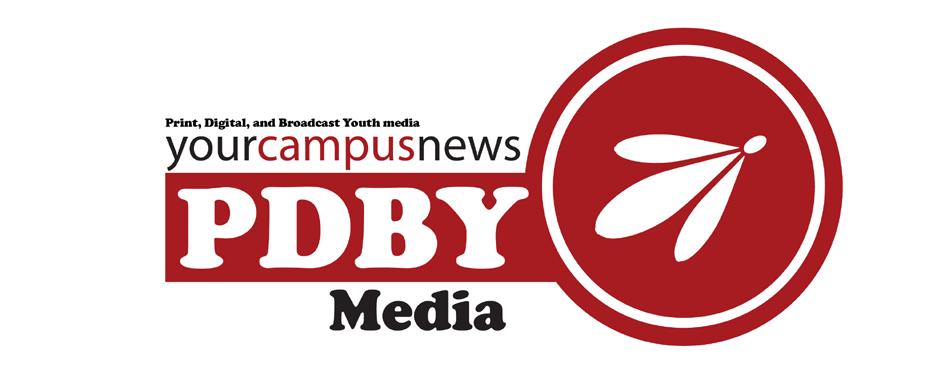
30 000 people read the print version of To advertise email carel.willemse@up.ac.za visit www.pdby.co.za for ad rates












 Compiled by Katherine Weber
Compiled by Katherine Weber








 Franco Marais
Franco Marais

















 Image: Katharine O’Ehley
Mpho Mabelesa and Christiaan Steenekamp
Photo: Sechaba Ntshehi
Mpho Mabelesa
Photo: Sechaba Ntshehi
Photo: Sechaba Ntshehi
Image: Katharine O’Ehley
Image: Katharine O’Ehley
Mpho Mabelesa and Christiaan Steenekamp
Photo: Sechaba Ntshehi
Mpho Mabelesa
Photo: Sechaba Ntshehi
Photo: Sechaba Ntshehi
Image: Katharine O’Ehley













